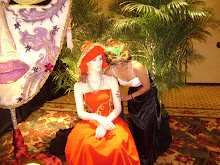It was a cold Saturday evening in October and I was winding down for the day. After a warm cup of tea, I snuggled within warm fleece blankets on the sofa and turned on the TV. As usual I would flip around all the channels before I can decide what program or movie I want to entertain myself with. While surfing the channels, I came upon a rerun of Los Premios MTV 2009. I paused there for a moment and suddenly the passion and excitement of the Latin music captivated my senses so I decided that I would watch the rerun as my entertainment for the evening.
I sat in the dark with low lights, big screen and surround sound. I was enjoying the music, the beautiful Latin artists, and presenters and of course the wonderful stage effects. I watched the award winners humbled by their win and some with teary eyes, thanked their fans. Of course the screaming audience was living every moment of the award ceremony. Suddenly I realized that all the Latin glamour, glitter, energy, and achievements of that MTV 2009 Award was reminding me of something special. It was a stark reminder of the annual incentive award program that I host to recognize the top sales men and women of the Latin America region for a large pharma company. That program was called Golden Circle.
As I watched the celebrated artists received their awards and made their speeches, I felt an emptiness that was profound – that emptiness reflected the fact that after four years of hosting the Golden Circle award program, it will no longer be under my wings since the company has undergone an acquisition. But it was one part of my job that brought me immense satisfaction – the planning for this event takes over nine months and its execution as always had to be flawless because for me, rewarding the men and women who are the drivers of the business was more than the compensation or the incentive trip – it was the black tie evening when they became superstars like those on the MTV scene. It was the night when they were celebrated, honored and photographed among their peers and loved ones. It was their night – their night to shine – to feel proud but more importantly to feel valued.
As a communications manager, my satisfaction was watching their faces light up and their eyes swelled with tears of joy as they are called upon the stage to receive their plaque and photographed. Over the years as I have done this program, it reinforced the fact that human beings value recognition and honor. It is what propels them to constantly give their best and to be defenders of their business. As a communicator, I say, it is not what you say, but how you say it, where you say it and the medium through which you say it that makes all the difference. Similarly, it is not what you do to reward your top performers, but how you reward them is what makes that reward so special and impacting.
Often I imagined the Golden Circle reward being only a cash prize and a congratulatory letter. That seems cold, distant and just okay in comparison to spending four days with senior management, a business workshop – a chance for the people in the field to have a chance to air their views and ask their questions and to crown it all, be treated like celebrities during the gala dinner and award ceremony. It is the how and the what that has the impact to these winners that leaves them eternally grateful for that moment. Their thanks are endless and upon returning to their homes, we get very emotional letters of how grateful they are for the special way in which they were treated and celebrated. For those winners, the award night was the greatest motivator of all! Would the cash prize and a congratulatory note create such profound reactions? I don’t think so.
As a communicator, I am a firm believer of the face to face communication because regardless of the growing social media, face to face communication will always play a key role in the motivational factor. After many decades, the most popular way of proposing marriage is still face to face. It still is, in my opinion, the most intimate and emotionally captivating way to do it. Face to face communication in many ways is time consuming we may say now that technology gives us the ability to communicate faster and with a wider reach; but depending on what we really want to achieve, sometimes, investing the time for face to face communication can provide more productive insights and build stronger relationships. It is the how and what factor.
(to be continued …)
How Much Is People Engagement Really Worth?
8 years ago





